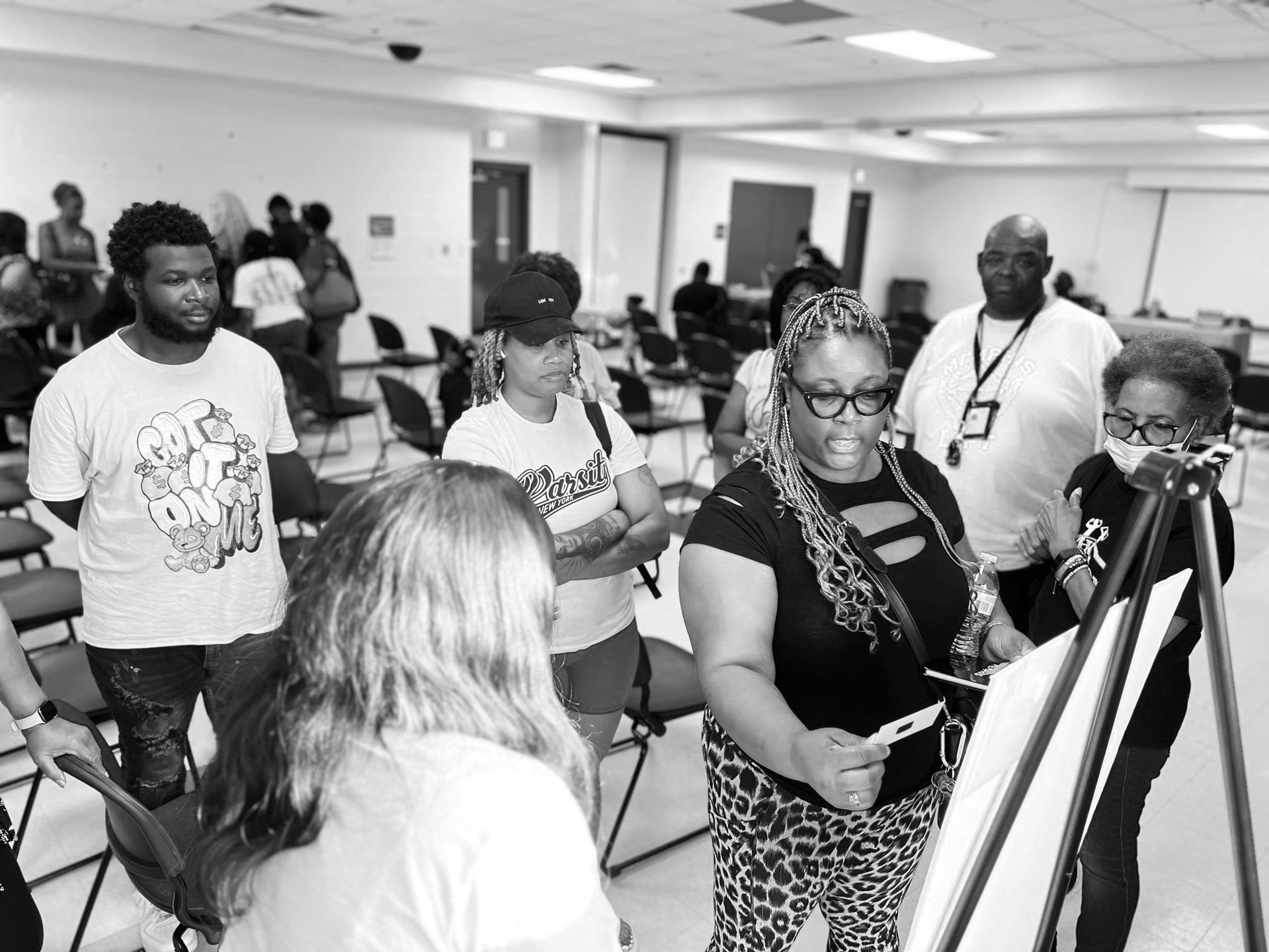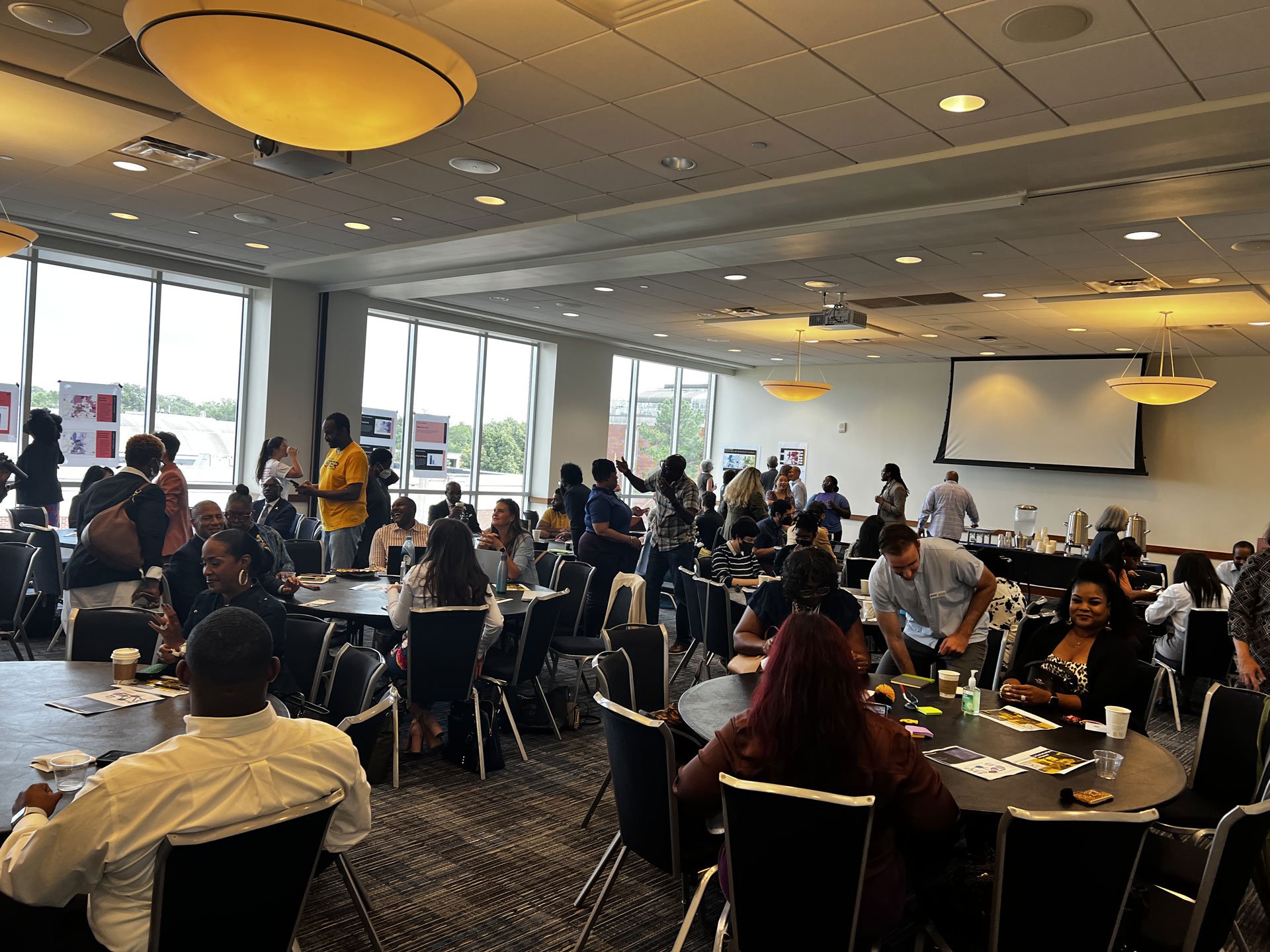The Plan
The More for Memphis plan is a comprehensive collection of statistical data, policy, social research, and insights from people living in our community.
All strong cities excel in 6 major areas: education and youth, culture and arts, health and well-being, justice and safety, community development, and economic development. These 6 focus areas were used as a guide for how the plan was organized and developed.
Using research and data, the plan identifies key issues residents face in these 6 focus areas and proposes several key strategies to address those pressing issues.

Listen to partners who contributed to the plan:
Learn about the major goal of the plan:

What is the goal of the plan?
The ultimate goal of the plan is to create long-lasting, sustainable improvements to the resources that all Memphis residents rely on for their quality of life, like the education, legal, and healthcare systems. The plan aims to create thriving neighborhoods all across Shelby County by ensuring that resources are distributed efficiently and effectively, that laws and policies are thoughtful and fair, and that all residents are guaranteed access to the basic things they need to live a healthy and productive life.
The plan strategically aligns strategies across four vital systems:
Children & Youth
Young Adult & Families
Community & Neighborhoods
City & County Ecosystem

What’s Inside the Plan
The plan was written by policy researchers and informed by groups called “anchor collaboratives.” Each of the 6 focus areas had its own anchor collaborative which consisted of nonprofits that work in the focus area, residents who are involved or invested in that focus area, and policy experts. Each anchor collaborative had a lead organization that convened other partners in work groups that informed their portion of the plan. Below is a summary of their findings.
Arts & Culture
About this focus area: Arts and Culture focuses on the cultivation and preservation of the arts (music, dance, theater, visual arts) and culture (museums, food, heritage sites, historical monuments).
Key Strategies
-
Improve access to fine arts education across the district with a particular concentration on expanding those opportunities for middle and high school students.
Offer more in-school and after-school partner programming that is accessible to all students regardless of income.
-
Currently, only 25% of Memphians have access to the arts. Expanding spaces like libraries, community centers, and community schools would increase accessibility.
Support “shovel-ready” projects that create or enhance spaces to get off the ground quickly
-
Establish an of ice in the city or county government that would coordinate the efforts of local artist organizations, pursue grant support for local artists, assist in the promotion and protection of their work, and integrate art into public development plans.
Learn More:
The People:
The Plan:
Community Development
About this focus area: Community Development concentrates on what makes a strong neighborhood. This group examined issue areas critical to thriving communities, including housing, parks, the environment, access to essential services (like groceries and clinics), and the ease of getting around in multiple ways, like walking or biking.
Key Strategies
-
The Memphis Housing Trust Fund was established to build new homes and improve existing homes in the Memphis area. In the past, this fund was not always maintained or implemented in a way that yielded the hoped-for impact. Restructuring it would allow for nonprofit and for-profit partners to come together to reimagine and redevelop it to better serve the community.
-
Renters facing eviction often do not know their rights nor have access to legal counsel that could help them avoid eviction. This strategy would work with both landlords and renters to ensure that mediation occurs and evictions are avoided. Doing this will help curb homelessness, particularly for households with children.
-
This would ensure that pedestrian safety infrastructure (like sidewalks and bike lanes) is actually present in neighborhoods across all of Memphis, instead of just some. This would help to create a sense of community that encourages individuals to engage with their environments and one another. It will also increase access to essential services and amenities, like clinics, groceries, or community centers.
-
Predatory lending practices create debt traps for families and disproportionately affect low-income residents. Annual percentage rates (APR) are over 400% for payday loans in Shelby County, which means families who access a payday loan may never be able to pay it off. These types of lenders often set up shop in low-income neighborhoods. Restricting their ability to do this through zoning rules and providing alternate, safer access to more fair and affordable loans will keep families out of debt cycles they can’t escape.
-
This type of plan will outline how the county can generate less waste and implement programs to reduce, reuse, and recycle more materials on a broader scale.
Learn More:
The People:
The Plan:
Economic Development
About this focus area: Economic Development addresses the local and regional economy, including labor, employers, and investments.
Key Strategies
-
Improve the number of qualified people available for hire by providing skills training and then providing trainees with job placements that match their skill sets.
Make sure workplaces are healthy and safe
-
Invest in cleaning up and restoring spaces so businesses can occupy them safely, and we can attract new businesses in high-growth industries
Provide support and training for community-based entrepreneurs to start their own businesses
-
Make sure families who need TANF benefits can access them, alleviate barriers and expenses to training, and improve their quality of life.
Create an established agency that coordinates all economic agencies and aligns them to common goals and outcomes for greater impact.
Learn More:
The People:
The Plan:
Education & Youth
About this focus area: Education and Youth concentrates on all aspects of the educational life of a child, from cradle to career.
Key Strategies
-
Offer consistent reading support to our youngest learners by providing things like home visits from professionals who can support families, literacy coaches who will work one-on-one with students, tutoring, and summer programs.
Address teacher shortages by making sure teachers feel supported through fair pay and professional development.
Ensure students are college and career-ready by providing them with technical training, career advising, and advanced courses.
-
Ensure that families know what resources are available and provide access to them via the Community Schools model.
Remove obstacles to academic success by making sure families have basic needs met.
Reduce the number of days students miss school through personalized support.
-
Have behavior specialists and ReSET rooms available to students who are struggling or acting out so they can avoid suspensions and stay present in school
Offer more advanced courses for students and make sure students are prepared to take those courses successfully, starting in middle school.
Offer more technical training and certifications.
Learn More:
The People:
The Plan:
Health & Well-being
About this focus area: This focus area takes a broad view of the factors necessary for physical, mental, and social wellness, with a specific focus on equitable access to care.
Key Strategies
-
Access to care for many Shelby County residents is severely limited because of a lack of insurance, nearby clinics, or income to pay for care—particularly for uninsured residents.
This strategy would establish school-based health centers inside community schools located in the highest-need areas so more residents can access high-quality affordable care in their community. These centers would not only be in an easy-to-access location but also offer financial assistance to residents seeking care. These clinics would be equipped to offer preventative care for chronic diseases that are common in Memphis communities, such as diabetes or kidney disease. These centers would not be limited to students and their families but would be open to all residents in the area and would offer a full suite of services including dental, vision, and mental health.
-
Currently, many families in Shelby County use SNAP benefits to purchase their groceries. One method of increasing the healthy foods they can buy is “doubling up” their benefits when they buy fruits and vegetables. This increases affordability and incentivizes picking these types of foods when shopping.
Access to fruits and vegetables is often a problem in communities, with many of them being “food deserts” with no full-service grocery stores near them. Micro-grocery stores that specifically carry produce and other fresh foods will be established in community schools to combat this problem.
-
Many residents live in old housing with lead-based paint and other environmental toxins. Over time, this exposure can lead to many health and developmental complications. Increasing lead testing and remediation can improve resident health by decreasing exposure to toxins.
Learn More:
The People:
The Plan:
Justice & Safety
About this focus area: The goal of this focus area is to take a comprehensive look at safety and decrease crime and violence experienced by all residents, with particular consideration for resident interactions with the legal system.
Key Strategies
-
This strategy would establish a connection between restorative justice programs that concentrate on rehabilitation and youth involved in the justice system. These programs would serve as an intervention for at-risk youth and work to keep them from returning.
-
Credible messenger programs connect individuals who have committed crimes with mentors who have lived experience and can guide them away from reoffending. Currently, Memphis has several credible messenger programs that can be expanded.
-
When people exit the criminal justice system after incarceration, they are often not supported in reestablishing their lives, leading to repeat offenses. This strategy aims to support individuals exiting the system to build new and better lives. This strategy also proposes greater funding and resources for legal representation, collecting more data on what is or is not working, and a greater coordinated strategy between community services partners on rehabilitating youth offenders.
Learn More:
The People:
The Plan:








